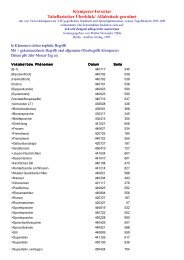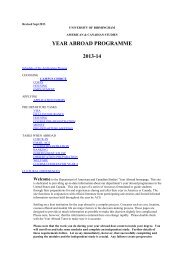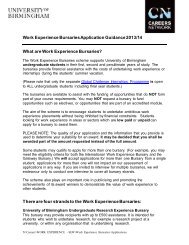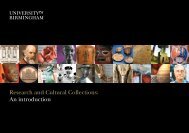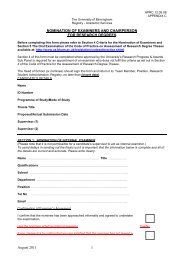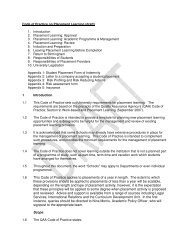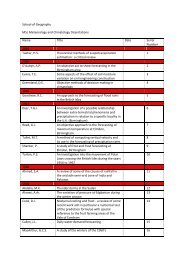reimagining-abstracts - University of Birmingham
reimagining-abstracts - University of Birmingham
reimagining-abstracts - University of Birmingham
Create successful ePaper yourself
Turn your PDF publications into a flip-book with our unique Google optimized e-Paper software.
connotative processes that surround the emergence and articulation <strong>of</strong> the “hellenochristian<br />
civilization.” It discusses the ways Byzantine controversies about the<br />
Ancient Greek thought were re-interpreted and re-conceptualized in the modern Greek<br />
context, mainly in the second half <strong>of</strong> the nineteenth century. The paper defines the<br />
reading <strong>of</strong> ancient Greek philosophy as <strong>of</strong> primary importance in a set <strong>of</strong> cultural<br />
politics that aimed at the re-conciliation <strong>of</strong> pagan thought and Christian metaphysics<br />
and at the formation <strong>of</strong> a canon that ruled their relation. The interest lies upon the<br />
image <strong>of</strong> three Church Fathers <strong>of</strong> the 4 th century, known as the “Three Hierarchs”, as<br />
both ideal readers <strong>of</strong> the ancients and as gate-keepers <strong>of</strong> Christian Orthodoxy. In this<br />
vein, the paper discusses the ways eleventh century disputes and polemics over the<br />
place <strong>of</strong> ancient thought in the curriculum <strong>of</strong> Byzantine (Christian) education reemerged<br />
in the nineteenth century. The “Three Hierarchs” became re-interpreted as<br />
“ideal types” <strong>of</strong> the so called “harmonious co-existence” between Ancient Greece and<br />
Orthodox Christianity. The paper also discusses how this particular reading <strong>of</strong><br />
patristic scholarship contributed to the institutionalization <strong>of</strong> an <strong>of</strong>ficial “school<br />
holiday” in honor <strong>of</strong> the “Three Hierarchs” in modern Greece. Main argument <strong>of</strong> the<br />
paper is that critical aspects <strong>of</strong> the Greek national narrative lie upon constant<br />
conceptual metamorphoses that incorporate older symbolic capital in a new setting<br />
and make possible the close intersection <strong>of</strong> ethnicity and religion. In this context, not<br />
only Byzantium stands as the critical link between Ancient and Modern Greece but<br />
Hellenism and Christianity are interpreted within the context <strong>of</strong> a “harmonious coexistence”.<br />
Stathis Gourgouris<br />
Derealizations <strong>of</strong> the Ideal: Walcott Encounters Seferis<br />
In Dream Nation (1996) I had argued that Greek modernity emerged from and was<br />
subjected to a condition, fostered by colonialist Europe, that I called the “colonization<br />
<strong>of</strong> the ideal” – the ideal, <strong>of</strong> course, signified by Greek antiquity. I reconsider this<br />
notion and re-evaluate its heuristic merit by examining the close relation <strong>of</strong> the<br />
poetics <strong>of</strong> George Seferis and the Caribbean poet Derek Walcott. Not only does<br />
Walcott seem to understand the problematic that Seferis was laboring under but<br />
directly addresses, in poetic form, the predicament <strong>of</strong> postcolonial Caribbean through<br />
a critical reading <strong>of</strong> Seferis’ own Neohellenic modernist predicament. I focus on a<br />
couple <strong>of</strong> poems by Walcott that counter Seferis’ Mythistorema explicitly, as well as<br />
the grand opus Omeros, which is a magnified Mythistorema from a Caribbean<br />
standpoint. The issue at hand is not only that a postcolonial poet determines his<br />
response to colonial Europe through a remythification <strong>of</strong> Greek antiquity, but even<br />
more how he mediates this remythification through a poetic encounter with Greek<br />
modernity. Walcott is known for coining the term “Afro-Greeks”; what’s underresearched<br />
in regard to this phrasing is how it requires, in his poetics, an assessment<br />
<strong>of</strong> Modern Greeks.<br />
Matthew Gumpert<br />
matthew.gumpert@boun.edu.tr<br />
Realpoetik in Cavafy’s ‘Give Back the Elgin Marbles’<br />
In the traumatic neuroses, Freud writes, “the dream life . . . continually takes the<br />
patient back to the situation <strong>of</strong> his disaster”; he is “obliged to repeat as a current<br />
experience what is repressed, instead <strong>of</strong>, as the physician would prefer to see him do,<br />
recollecting it as a fragment <strong>of</strong> the past” (Beyond the Pleasure-Principle, trans. J.<br />
Strachey). This compulsion to repeat as a current experience, instead <strong>of</strong> recollecting<br />
8



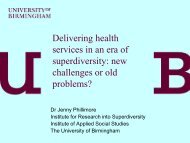
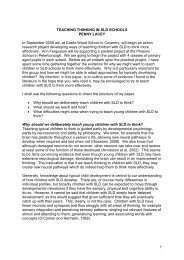
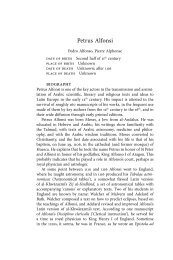
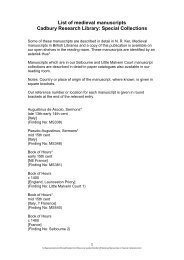
![Benyamin Asadipour-Farsani [EngD Conference abstract]](https://img.yumpu.com/51622940/1/184x260/benyamin-asadipour-farsani-engd-conference-abstract.jpg?quality=85)

